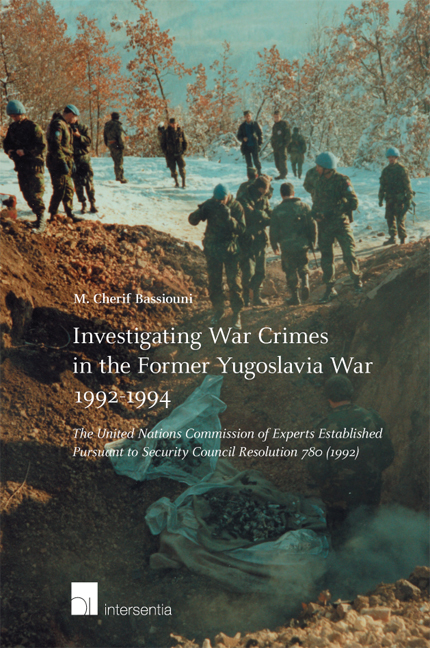 Investigating War Crimes in the Former Yugoslavia War 1992–1994
Investigating War Crimes in the Former Yugoslavia War 1992–1994 Book contents
- Frontmatter
- Contents
- Dedication
- About this Book
- About the Author
- Acknowledgement
- Table of Abbreviations
- Table of Authorities
- Chapter I Background on the Conflict in the Former Yugoslavia
- Chapter II Some Pictorial Descriptions
- Chapter III An Overview of the Realpolitik and the Workings of the Commission of Experts
- Chapter IV Precedents Leading to United Nations Security Council Resolution 780 (1992)
- Chapter V The Commission of Experts’ Establishment and Processes
- Chapter VI Final Report of the Commission of Experts Established Pursuant to Security Council Resolution 780 (1992) and Annex Summaries and Conclusions
- Chapter VII The Absence of a Transition between the Commission of Experts and the ICTY
- Chapter VIII Experiences that Affected Me the Most During My Tenure on the Commission of Experts
- Chapter IX Concluding Reflections
Chapter VIII - Experiences that Affected Me the Most During My Tenure on the Commission of Experts
Published online by Cambridge University Press: 12 October 2018
- Frontmatter
- Contents
- Dedication
- About this Book
- About the Author
- Acknowledgement
- Table of Abbreviations
- Table of Authorities
- Chapter I Background on the Conflict in the Former Yugoslavia
- Chapter II Some Pictorial Descriptions
- Chapter III An Overview of the Realpolitik and the Workings of the Commission of Experts
- Chapter IV Precedents Leading to United Nations Security Council Resolution 780 (1992)
- Chapter V The Commission of Experts’ Establishment and Processes
- Chapter VI Final Report of the Commission of Experts Established Pursuant to Security Council Resolution 780 (1992) and Annex Summaries and Conclusions
- Chapter VII The Absence of a Transition between the Commission of Experts and the ICTY
- Chapter VIII Experiences that Affected Me the Most During My Tenure on the Commission of Experts
- Chapter IX Concluding Reflections
Summary
As I reflect on my time as member and then chair of the Commission of Experts in the former Yugoslavia, certain events and experiences stand out among the rest. These memories often reflect the worst of humanity, situations that undoubtedly haunt all those who experienced them. But there were also people and moments that exemplified true humanity, goodness in a time of war and horror. Throughout my tenure on the Commission of Experts, over and over again, I promised myself and others that those moments, people and stories would not be forgotten. This is what is found in the Annexes to the Final Report, which are available online through Intersentia Publishing. But even the detailed accounts contained in the annexes do not tell the human dimensions of the stories; some of which have deeply affected me. What follows is my attempt to ensure that the courage and strength of those who opened up their hearts and shared their worst memories to me and my team, was not in vain.
The most telling of my experiences in various theaters of conflicts began when I was first working in the former Yugoslavia in 1992 and somebody gave me a videotape. The tape showed of a group of Sulafists, probably coming from Saudi Arabia, playing soccer with the decapitated head of a Serb. If I had not seen it on a screen, I would have said that it was made up. No one will believe it, but years later when I was the United Nations independent expert on Human Rights in Afghanistan, I was given pictures of another young group of men, this time Taliban, playing with severed head of someone else from another Muslim village. Later, when I chaired the United Nations OHCHR Commission of Inquiry for Libya, without any rhyme or reason, ISIS in Libya decapitated 21 Egyptian Christians. They did the same with respect to 8 hostages for whom they did not receive ransom. By no stretch of the imagination can anyone find a justification under Islamic law, Christianity, Judaism or any religious belief for desecrating the dignity of another human being in this manner.
- Type
- Chapter
- Information
- Investigating War Crimes in the Former Yugoslavia War 1992–1994The United Nations Commission of Experts Established Pursuant to Security Council Resolution 780 (1992), pp. 417 - 442Publisher: IntersentiaPrint publication year: 2017


